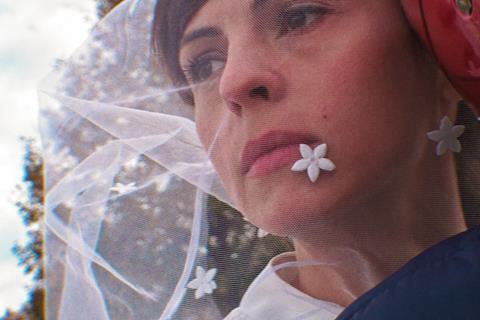A mother’s struggles to regain custody of her daughter form the core of Aida Begic’s uneven drama

Dir/scr: Aida Begic. Bosnia and Herzegovina. 2022. 120 mins.
A thirty-year-old woman finds herself in limbo between a not-quite-marriage and a not-quite-divorce in A Ballad, the uneven fourth feature by Bosnian writer-director Aida Begic. Premiering in the main competition at Sarajevo, this empathetic character study seeks to breathe life into a soap-opera-like storyline with stylistic flights of fancy — most of which land awkwardly. The reputation Begic formed with her first two features will ensure a measure of further festival exposure, but limited impact seems likely beyond the confines of ex-Yugoslavian territories.
The viewer is left with a sense of bemused bathos rather than an impression of a tale having been satisfactorily wrapped up
Begic’s debut Snow won the Grand Prix in Cannes’ Critics’ Week in 2008; her follow-up Children Of Sarajevo (aka Djeca) made the French festival’s Official Selection four years later and received a special mention in the Un Certain Regard competition. Shifting her focus from her homeland — and the impact of the 1990s wars on its residents — to the plight of Syrian refugee children in Turkey with Never Leave Me (2017) yielded considerably lower levels of acclaim and exposure. Returning to Bosnia for A Ballad feels more like a water-treading exercise than the kind of enterprise that might return Begic to the international limelight.
Children Of Sarajevo star Marija Pikic is the film’s main focus throughout as Meri, a woman emerging from a long and turbulent relationship with Hasan (Milan Tocinovski). Meri’s lack of gainful employment resulted in Hasan being awarded custody of their eight-year-old daughter Mila (Gaia Tanovic); her attempts to alter this situation are complicated by her ongoing joblessness, and the fact that she and Hasan were never actually married. Goaded by her pushy mother Zafira (Jasna Zalica), Meri seeks advice from family-friend lawyer Samir (Slaven Vidak), an older man with whom she had some kind of fling many years before. “You really broke my heart,” mopes sad-sack Samir, who later seizes his chance to make amends for previous romantic disappointments.
Meri is a passive protagonist throughout; we deduce that she has been rendered mousy by prolonged exposure to her force-of-nature mama. Her younger brother Kemo (Enes Kozlicic) is likewise a feckless mother’s boy — all of the male characters in this squarely distaff-oriented affair are either unsympathetic, ludicrous or violently hot-headed. It also seems fair to conclude that Meri’s emotional immaturity led her into an ill-advised relationship with Hasan, who is only intermittently glimpsed; he remains a shadowy background player (often shot in moody blue lighting by Erol Zubcevic) instead of a fully-fleshed character.
Although Meri appears to be buffeted by fickle fate, much of this is actually Begic stacking the deck against her creation by means of serial scriptwriting contrivances. She only really takes control of her hapless situation in the closing minutes; and even this belated assertion of independence is undermined by its taking place in a Brechtian coda during which the fictional/cinematic nature of her story is openly acknowledged. Such an eleventh-hour rug-pull is a drolly offbeat decision on the part of the filmmaker (the concluding meta-conversation between “Meri” and “Mila” is undeniably amusing) but also represents something of a cop-out; the viewer is left with a sense of bemused bathos rather than an impression of a tale having been satisfactorily wrapped up.
Begic embroiders her basic narrative in two ways. Padding out the running time to a taxing two hours, she regularly inserts vignettes in which several of the characters audition for a film — details of which are left very vague — to be shot in their small city, a place where most folks harbour some kind of showbiz-related ambitions. Zafira, for example, sees the chance to resume the singing career she abandoned when she became pregnant with Meri. The very first moments see Meri at her audition, asked by an offscreen interlocutor how she defines freedom. “Life without fear, maybe,” is her eventual reply. Later she delivers a monologue from Chekhov’s The Seagull, revealing unsuspected and somewhat implausible thespian skills.
This structuring device works more smoothly than Begic’s other occasional interpolations: impressionistic montages, often involving clunky, retro-looking video-superimpositions and back-projections, which add little to our understanding of the characters or their situations, and cumulatively betray Begic’s lack of confidence in her own material.
Production company: Film House
International sales: Film House, info@filmhouse.ba
Producers: Aida Begic, Adis Djapo, Erol Zubcevic
Cinematography: Erol Zubcevic
Production design: Emina Kujundzic
Editing: Redzinald Simek
Main cast: Marija Pikic, Jasna Zalica, Amar Custovic, Davor Golubovic, Enes Kozlicic, Slaven Vidak, Lana Stanisic, Milan Tocinovski, Gaia Tanovic
























